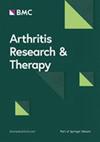Immunological effects of CD19.CAR-T cell therapy in systemic sclerosis: an extended case study
IF 4.9
2区 医学
Q1 Medicine
引用次数: 0
Abstract
The high potential of CD19.CAR-T cells to treat autoimmune diseases such as Systemic Sclerosis (SSc) supposedly relies on the disappearance of autoantibodies. Here we investigated effects of CAR-T cells on the innate immune system which is an important contributor to pathology in SSc. Longitudinal analysis of peripheral blood mononuclear cells from an Scl70 + SSc patient treated with CAR-T cells sampled over 18 months by 29-color spectral flow cytometry, in vitro experiments using sera from patient cohorts. In the patient treated with CAR-T cells, the substantial clinical improvement was paralleled by dynamic changes in innate lymphoid cells, namely Fcγ-receptor IIIA-expressing natural killer (NK) cells. NK cells adopted a more juvenile, less activated, and less differentiated phenotype. In parallel, the potency of serum to form Scl70-containing immune complexes that activate Fcγ-receptor IIIA decreased over time. These observations suggested a mechanistic link between reversal of adaptive autoimmunity and recovering Fcγ-receptor IIIA-expressing innate immune cells after CAR-T cell therapy via regressing immune complex activity. Experiments with sera from the non-CAR-T-treated SSc cohort confirmed that Scl70-containing immune complexes activate Fcγ-receptor IIIA-expressing NK cells in a dose-dependent manner, substantiating the relevance of this link between adaptive and innate immunity in SSc. This report describes for the first time the phenotypic recovery of innate Fcγ-receptor-expressing cells in an SSc patient treated with CAR-T cells. Decreasing autoantibody levels associated with a reduced ability to form functional immune complexes, the latter appearing to contribute to pathology in SSc via activation of Fcγ receptor IIIA + cells such as NK cells. Proposed mechanism of involvement of NK cells and soluble Immune Complexes (sICs) in disease progression during active autoimmunity in SSc (left) and resolution of fibrosis after deep B cell depletion by CD19.CAR-T cells and disappearance of autoantibodies (right).CD19的免疫作用。CAR-T细胞治疗系统性硬化症:一个扩展的案例研究
CD19.CAR-T细胞治疗系统性硬化症(SSc)等自身免疫性疾病的巨大潜力理应依赖于自身抗体的消失。在这里,我们研究了CAR-T细胞对先天性免疫系统的影响,先天性免疫系统是导致系统性硬化症病理变化的重要因素。我们使用 29 色光谱流式细胞仪对一名接受 CAR-T 细胞治疗的 Scl70 + SSc 患者 18 个月的外周血单核细胞进行了纵向分析,并使用患者队列中的血清进行了体外实验。在接受 CAR-T 细胞治疗的患者中,先天性淋巴细胞(即表达 Fcγ 受体 IIIA 的自然杀伤(NK)细胞)发生了动态变化,临床症状也得到了显著改善。NK 细胞的表型更年轻、活化程度更低、分化程度更低。与此同时,血清形成含 Scl70 的免疫复合物以激活 Fcγ 受体 IIIA 的效力也随着时间的推移而降低。这些观察结果表明,CAR-T 细胞疗法后,适应性自身免疫的逆转与表达 Fcγ 受体 IIIA 的先天性免疫细胞通过免疫复合物活性的恢复之间存在机理上的联系。用未接受过CAR-T治疗的SSc患者的血清进行的实验证实,含Scl70的免疫复合物能以剂量依赖的方式激活Fcγ受体IIIA表达的NK细胞,从而证实了SSc中适应性免疫和先天性免疫之间的这种联系的相关性。本报告首次描述了接受CAR-T细胞治疗的SSc患者先天Fcγ受体表达细胞的表型恢复情况。自身抗体水平的降低与形成功能性免疫复合物的能力下降有关,后者似乎是通过激活 Fcγ 受体 IIIA + 细胞(如 NK 细胞)而导致 SSc 病变的。NK 细胞和可溶性免疫复合物(sICs)参与 SSc 自身免疫活跃期疾病进展的拟议机制(左图),以及 CD19.CAR-T 细胞深度消耗 B 细胞和自身抗体消失后纤维化的缓解(右图)。
本文章由计算机程序翻译,如有差异,请以英文原文为准。
求助全文
约1分钟内获得全文
求助全文
来源期刊

Arthritis Research & Therapy
RHEUMATOLOGY-
CiteScore
8.60
自引率
2.00%
发文量
261
审稿时长
14 weeks
期刊介绍:
Established in 1999, Arthritis Research and Therapy is an international, open access, peer-reviewed journal, publishing original articles in the area of musculoskeletal research and therapy as well as, reviews, commentaries and reports. A major focus of the journal is on the immunologic processes leading to inflammation, damage and repair as they relate to autoimmune rheumatic and musculoskeletal conditions, and which inform the translation of this knowledge into advances in clinical care. Original basic, translational and clinical research is considered for publication along with results of early and late phase therapeutic trials, especially as they pertain to the underpinning science that informs clinical observations in interventional studies.
 求助内容:
求助内容: 应助结果提醒方式:
应助结果提醒方式:


